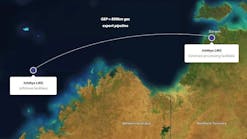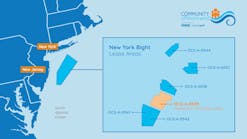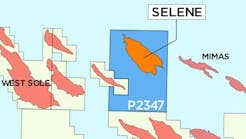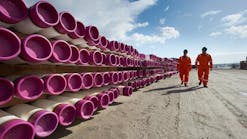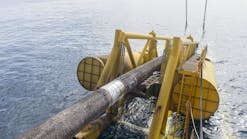Three gas pipeline proposals all have infrastructure limits
William FurlowThe present proposals to move gas off the NW Atlantic are too limiting and would unduly constrain the exploration for oil and gas from areas such as the Grand Banks, contend the government of Newfoundland & Labrador and at least one aspiring gas transporter.
Contributing Editor
This argument comes from the latest among the three contenders to build a pipeline to transport Sable Island gas to Canada and the US. Deeptech International, which operates a US Gulf of Mexico pipeline through a subsidiary, is a late comer to the Sable Island pipeline conundrum. The firm is seeking to form a partnership that would go head-to-head with two contenders, Maritimes & Northeast, owned by Mobil Canada, and Trans-Quebec & Maritimes, owned by TransCanada Pipelines and Gaz Metropolitan and Co.
The big difference between the existing proposals and Deeptech's offer is that Deeptech would keep the gas offshore all the way to New England rather than using existing gas lines or building new land lines. The latter will involve right-of-way acquisitions, that could be time-consuming and expensive, Deeptech contends. However, Deeptech's critics say the firm's proposal could reduce access to the lines for Canadian distributors.
In addition to the cost of an all-offshore line from Nova Scotia to New England, The Deeptech proposal would include a leg from the Grand Banks. The Grand Banks leg, running northeast from Sable Island, would have to contend with the potential iceberg situation and a rocky bottom, much different than the silt floor of the Gulf of Mexico where the company has gained experience.
The Deeptech proposal does not address the needs of the newly opened Canadian gas market in Quebec City. On the other hand, the Deeptech pipeline will offer greater volume and provide an infrastructure that will be essential for the further development of the Grand Banks area. Because most of the pipeline will be laid offshore, there is a possibility that the line can be ready to produce faster than its onshore counterparts.
Experience developing this type of infrastructure is Deeptech's biggest asset, according to Tatham (Deeptech subsidiary) Senior Vice President Dennis Kunetka who said that Deeptech hopes to be the manager of several partners involved in this ambitious program.
US Gulf similarity
Kunetka said his company sees the situation off Canada to be similar to the Gulf of Mexico at the edge of the continental shelf and beyond 10 years ago, where there were large gas reserves, but little infrastructure. He said his company is confident the experience it gained in the Gulf will transfer to the Canadian Atlantic situation.Deeptech hopes to join the contentious fray already in progress and will benefit from the squabbling between the other two contenders and one of the host countries, Nova Scotia. A disagreement over price has lead to a series of hearings by the Canadian National Energy Board to determine a route for the pipeline. Trans-Quebec is hoping to stall a decision while it organizes its own bid. Trans-Quebec said that once its bid is submitted , it should outrank the others because of the details and planning submitted with it.
The only company that seems ready to go is Maritimes & Northeast, which has proposed a land route to carry the gas from Maine to Boston. This group was starting to worry over the delays caused by the other bids and had gone so far as to threaten to pull its bid if the board did not make a decision soon.
Mobil's argument was that the delays would affect its time line, thus altering its bid. Mobil's opinion has a lot of pull since it is the lead developer of the field. The board has agreed to come to a decision by the end of September.
Southern line approval
In August, the southern, or US portion of the Maritimes & Northeast Pipeline received approval from the Federal Energy Regulatory Commission. What is called Phase I of this project will cover about 66 miles of 30-in. pipeline between Dracut, Mass. and Wells, Maine. Phase II is still awaiting approval in Canada. This is not only good news for Maritime, but also Trans-Quebec, which would benefit from the infrastructure Phase I creates. Deeptech representatives said the company has plans to tie its proposed pipeline into this Phase I. Although Deeptech would not name any of the members in its group, company representatives said a proposal will be put before the FERC and CNEB by mid September. The Trans-Quebec & Maritime plan was designed to feed natural gas to the Boston market, along a route that reaches Montreal before turning south. Vice President Robert Heider, with TQM said he expects a decision by the summer of 1998.Regardless of which plan is approved, the stakes are high, The fields off of the Sable Islands hold an estimated 3 tcf of reserves and the development budget sits at C$3 billion. The pipeline proposed by Deeptech would carry that gas 1,367 miles offshore to make landfall in New Hampshire. By traveling under the sea, Deeptech may cut costs, but it will also cut access, according to Maritime & Northeast, who said this route cuts off the markets of Nova Scotia, New Brunswick, and Maine. With the approval of Phase I, MNP can stick with its original timeline for the entire proposal, said George Mazanec, company chairman.
The questions remain. If either the Maritime & Northeast plan or the Trans-Quebec plan is chosen, will there be sufficient infrastructure to add on later? At this point - does it matter?
Copyright 1997 Oil & Gas Journal. All Rights Reserved.
